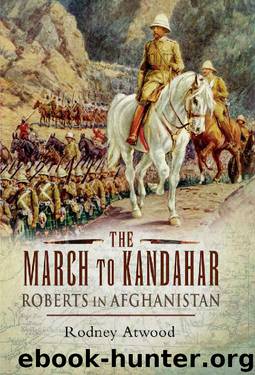The March to Kandahar: Roberts in Afghanistan by Rodney Atwood

Author:Rodney Atwood [Atwood, Rodney]
Language: eng
Format: epub
Publisher: Casemate Publishers
Published: 2012-11-13T18:30:00+00:00
Chapter 7
Backs to the Wall
The invader of Afghanistan may count as inevitable a national rising against him ... tribesmen and disbanded soldiers sprang to arms, the banner of the Prophet was unfurled, and the nation heaved with the impulse of fanaticism.
Archibald Forbes, Afghan Wars
We have entered into conflict with a race of tigers.
Colonel Charles Metcalfe MacGregor
As winter approached, the British and Indian soldiers at Kabul prepared for a severe drop in temperature. Mortimer Durand had his hair cropped too short to part, grew a six weeks’ beard, and wore ‘a button up shikar’ and over it at night a huge and very dirty poshteen (sheepskin). His riding breaches were inserted, not into respectable boots, but into ‘puttees’, i.e. strips of cloth rolled round the leg down to the ankle, and finally a pair of thick ammunition boots which had not seen polish since he left Simla. He managed to keep clean with ‘real English soap’ and a hole in the ground with a waterproof sheet spread over it making ‘a capital bath’.1 George White told his wife he could not understand where the intense, cold wind which blew through the tents came from, for the sky was as blue as their daughter Rosey’s eyes. White missed the girl and her mother, and was pleased to hear that Rosey had enjoyed seeing father’s dispatches in The Times and sketches of him leading his men in tartan trews in the Pictorial News. He found writing as a war correspondent for The Times a burden, but was angrier still that a Captain Norman, a young man cashiered from the Frontier Force for forgery, was writing articles headed ‘Afghanistan’. Using MacGregor’s detailed gazetteer and White’s letters, Norman could dishonestly give the impression of first-hand knowledge. White was furious with such armchair generals. ‘Roberts could sail round the lot of them. Our first object in the advance on Kabul was to get there as soon as possible and strike before the people and the soldiery ... unite[d] to oppose us.’2
Events however were soon to test White’s confidence in Roberts. As ice formed on water jugs at Kabul, Afghan temperatures were rising. The executions and the Amir’s deposition added fire to resentment. The necessity of laying in food, forage and fuel for the winter precipitated events, for Roberts had appropriated the government share of the crop to feed his troops. As in 1841, when the previous invasion of Afghanistan by the Indian Army took place, high prices paid by British commissaries on the open market caused inflation and shortages. An isolated fall of snow on 11 November warned Roberts that the collection of five months’ supplies, the amount he calculated necessary, had to be speeded up. But the local collection met increased reluctance from villagers, and there were rumours of the assembling of large bands of armed men, inspired by the cry of Jehad or holy war raised foremost by the Mullah Mir din Mummad of Ghazni, known as Mushk-i-Alam (‘Fragrance of the Universe’). He was aged about ninety, a man held in great reverence and esteem, and noted for his piety and learning.
Download
This site does not store any files on its server. We only index and link to content provided by other sites. Please contact the content providers to delete copyright contents if any and email us, we'll remove relevant links or contents immediately.
| Afghan & Iraq Wars | American Civil War |
| American Revolution | Vietnam War |
| World War I | World War II |
Waking Up in Heaven: A True Story of Brokenness, Heaven, and Life Again by McVea Crystal & Tresniowski Alex(37025)
Empire of the Sikhs by Patwant Singh(22188)
We're Going to Need More Wine by Gabrielle Union(18089)
Hans Sturm: A Soldier's Odyssey on the Eastern Front by Gordon Williamson(16873)
Leonardo da Vinci by Walter Isaacson(11927)
The Radium Girls by Kate Moore(10924)
Educated by Tara Westover(7086)
Tools of Titans by Timothy Ferriss(6972)
How to Be a Bawse: A Guide to Conquering Life by Lilly Singh(6706)
The Last Black Unicorn by Tiffany Haddish(5085)
Permanent Record by Edward Snowden(5009)
The Rise and Fall of Senator Joe McCarthy by James Cross Giblin(4854)
Promise Me, Dad by Joe Biden(4461)
The Wind in My Hair by Masih Alinejad(4430)
The Crown by Robert Lacey(4120)
A Higher Loyalty: Truth, Lies, and Leadership by James Comey(4044)
The Iron Duke by The Iron Duke(3655)
Joan of Arc by Mary Gordon(3272)
How to be Champion: My Autobiography by Sarah Millican(3197)
